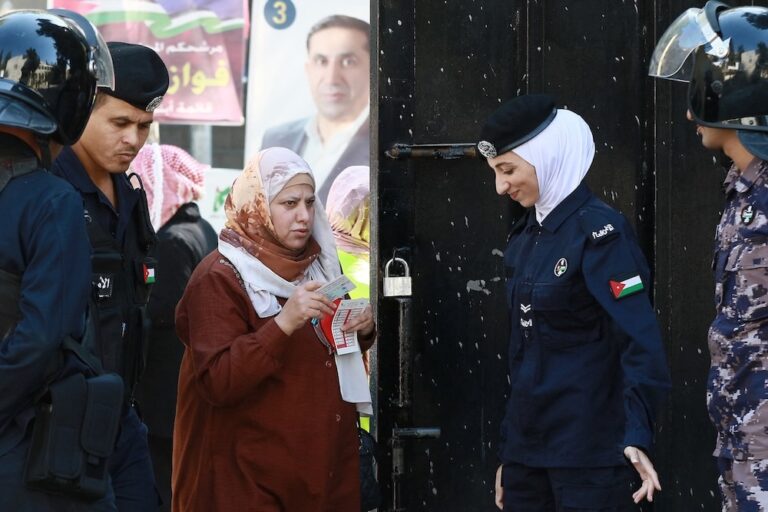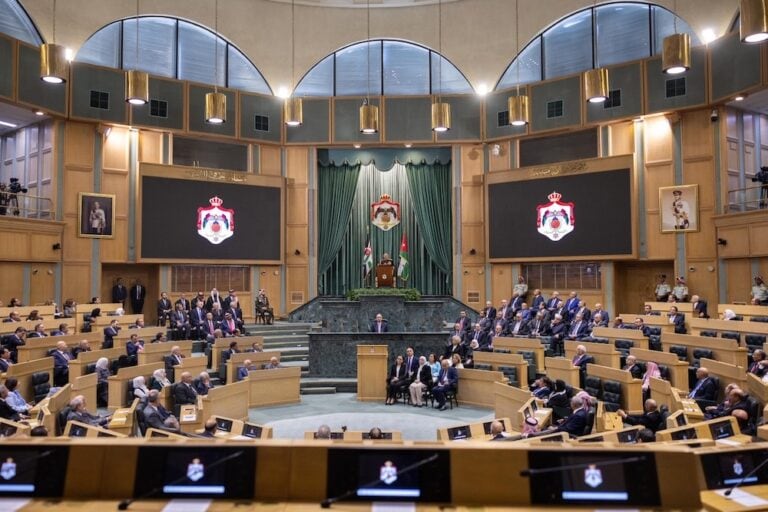The reintroduction of potential prison terms for online journalists has gained attention in recent weeks after two journalists were detained in the wake of a government body’s ruling that the new law – Art. 11 of Jordan’s Cyber Crimes Law, which addresses defamation or insult in materials posted online – supersedes an explicit prohibition against imprisonment in Jordan’s Press and Publications Law.
This statement was originally published on freemedia.at on 19 November 2015.
The International Press Institute (IPI) today called on Jordan to repeal a new law reintroducing prison sentences as a potential punishment for journalists operating in the online sphere and for the head of the country’s Media Commission to follow through on a commitment to start a process to swap the country’s news website licensing requirement for a registration system.
IPI made those calls as it unveiled “Jordan’s Online Freedom Media at Stake”, a report on a May 19 to 21 IPI press freedom mission to the country to push for changes to the licensing scheme and to gather facts related to the development of IPI’s OnLine project to promote digital safety and protect media freedom online.
The reintroduction of potential prison terms for online journalists has gained attention in recent weeks after two journalists were detained in the wake of a government body’s ruling that the new law – Art. 11 of Jordan’s Cyber Crimes Law, which addresses defamation or insult in materials posted online – supersedes an explicit prohibition against imprisonment in Jordan’s Press and Publications Law. That bar was a key part of government efforts to mollify critics of 2012 amendments that added the registration requirement and other strict provisions to the Press and Publications Law.
IPI Director of Advocacy and Communications Steven M. Ellis said that the change represented a “troubling step backward for media freedom in Jordan” and he urged lawmakers to take immediate steps to ensure that the prohibition on imprisonment applied to all journalists.
“In addition to the tremendous potential for abuse that criminal defamation and insult laws always carry, this new provision, as interpreted, strips certain journalists of a protection that all journalists were promised in exchange for complying with the Press and Publications Law,” Ellis noted. “Journalists shouldn’t face a greater risk of being sent to prison merely because they work online.”
Turning to the news website licensing requirement, Ellis also highlighted the pledge that the head of Jordan’s Media Commission, Dr. Amjad Al-Kadi, made in a meeting with delegates from IPI and the Amman-based Center for Defending Freedom of Journalists (CDFJ) during the May mission. Al-Kadi told the delegates that he favoured bringing together representatives from online media, local media associations and international organisations in October or November 2015 as a first step in transitioning from the current scheme to a more progressive framework that would not require those who wish to create a news website to first obtain government consent.
Members of Parliament with whom the delegates met during the mission – Dr. Zakaria Al-Sheikh, the head of Parliament’s National Guidance Committee, Jamil Nimri, the Committee’s media member, and opposition MP Dr. Rula Al-Hroob – expressed support for such a move, as did IPI. However, IPI, which has visited Jordan three times since more than 300 websites were shut down in June 2013 for not having a licence, cautioned at the close of the May mission that the pledge – which echoed similar, past comments by Jordanian government representatives – needed to be followed by action.
“Requiring news websites to seek government approval before they can share information online is a serious and undue burden on media freedom, especially when a simple registration system would be more than sufficient to allow those who feel wronged by such websites to seek remedies under existing civil law,” Ellis said today. “The time has come for officials to follow through and take concrete steps toward making this change.”
The report released today focuses not only on the challenges that the licensing system poses for independent media in Jordan, but on a number of other restrictions hindering online journalism. In addition to Art. 11 to the Cyber Crimes Law, one of the most severe challenges is Jordan’s Anti-Terrorism Law, which, coupled with a number of other legal provisions and changes in recent years, has left journalists afraid to speak openly about terrorism, about the country’s royalty and its relationship with its allies, or about actions by Jordan’s military in the Saudi-led air campaign in Yemen and in the fight against the Islamic State group.
Vague definitions given to terms such as “terrorism” mean that nearly any disfavoured reporting can fall within the law’s remit. Moreover, despite limitations to the jurisdiction of military-run State Security Courts, journalists have found themselves before such courts on several occasions in recent years. As a result – the IPI report notes, citing a CDFJ study released earlier this year – self-censorship has risen among journalists in Jordan in recent years, with some 95 percent of journalists reporting that they censor themselves and nine out of 10 journalists saying they have avoided reporting on topics such as military actions against violent extremist groups.
Recommendations
Amid that backdrop, the IPI report makes a series of recommendations, including that Jordan’s government:
-Reform Art. 11 of the Cyber Crimes Law in order to restore the Press and Publications Law’s bar on imprisonment and ensure that it extends to journalists operating online
-Move to amend Jordan’s Press and Publications Law to drop the licensing scheme and provisions limiting who may serve as editor-in-chief of a news website, and to prevent sites’ editors and writers from being held liable for comments posted by readers
-Reform Jordan’s Press Association Law to allow broader membership and to allow journalists to form alternative unions or associations to represent them
-Amend the Anti-Terrorism Law to clearly and narrowly define broad terms, while ensuring respect for the public’s right to share and receive information in the public interest
-Ensure that offences, such as insult or defamation, that inhibit criticism of the government comply with international standards by dealing with them under civil, rather than criminal, law, and at a minimum, abolish any provisions that would allow journalists to be imprisoned for their work
-Repeal laws that allow journalists to be tried in military courts
-Call publicly on Jordanians to refrain from all intimidation or harassment of journalists
-Promote digital safety and the use of encryption tools to protect the safety of journalists and the anonymity of journalists’ sources and consumers of online media
Download the report “Jordan’s Online Media Freedom at Stake”.



